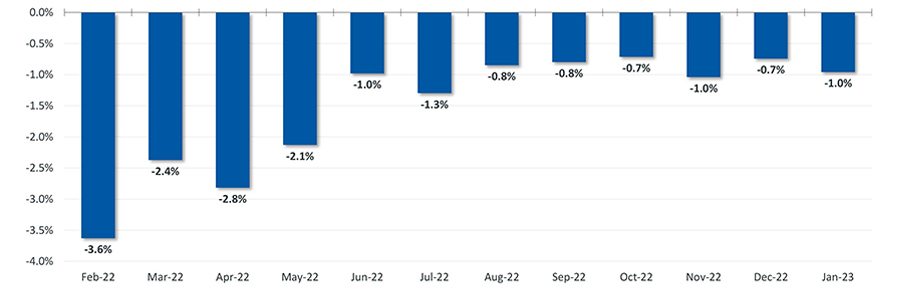
What You Should Know:
– Hospitals enter 2023 on more stable footing following the worst financial year since the start of the pandemic—but challenges persist, according to the newest data from Kaufman Hall.
– The latest National Hospital Flash Report finds that hospitals continue to experience the same challenges that made 2022 the worst financial year since the start of the pandemic, including higher labor expenses, lower patient volumes, and a fundamental shift in where patients are accessing care services. The National Hospital Flash Report draws on data from more than 900 hospitals from Syntellis Performance Solutions.
Early 2023 Performance Promising, but Still Lags Behind 2021 and 2020
Hospitals realized stronger financial performance in January 2023 compared to the previous year, as the start of 2022 coincided with the Omicron variant surge. The median year-to-date (YTD) operating margin index for hospitals was -1% in January 2023, compared to -3.7% in January 2022. The 2023 YTD operating margin index was still lower than that of 2021 at -0.1%, and 2020 at 3.1%.
Hospitals Face Persistent Expense Challenges
Patient volumes, emergency department visits, discharges and total revenues were down in January 2023 compared to December 2022. Meanwhile, expenses—particularly related to labor—increased over the same period. Total net operating revenue decreased by 3% month-over-month, while total expenses rose by 1%. Total labor expenses rose by 3% month-over-month. Notably, drug expenses have increased 12% compared to YTD 2020. The increase in drug expenses tied with lower patient volume and longer emergency department stay time indicates that hospitals are serving sicker patients in inpatient settings since the start of the pandemic.
Margins Decrease Slightly from End of 2022
Hospital operating margins in January 2023 were down slightly from -0.7% in December 2022 to -1% in January 2023 following the trend of persistent negative margins throughout last year.
One factor that contributed to the dip in performance, according to Kaufman Hall experts, is the normal trend of hospitals making purchases for the year in January.
